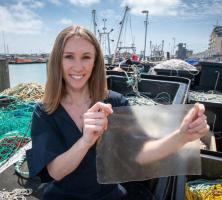 Lucy Hughes, a 24-year-old recent engineering graduate of the University of Sussex has won this year’s James Dyson Award for developing a biodegradable plastic from fish waste — the fish scales, skins, and guts discarded from fish processing plants. The material, MarinaTex, won Hughes the £30,000 (nearly $39,000) award, given to a recent design or engineering graduate who develops a product that solves a problem with ingenuity. Hughes beat out 1,078 entrants from 28 different countries.
Lucy Hughes, a 24-year-old recent engineering graduate of the University of Sussex has won this year’s James Dyson Award for developing a biodegradable plastic from fish waste — the fish scales, skins, and guts discarded from fish processing plants. The material, MarinaTex, won Hughes the £30,000 (nearly $39,000) award, given to a recent design or engineering graduate who develops a product that solves a problem with ingenuity. Hughes beat out 1,078 entrants from 28 different countries.
Smithsonian reports that MarinaTex is strong, flexible and translucent, with a feel similar to plastic sheeting. It biodegrades on its own in four to six weeks, which gives it a major sustainability advantage over traditional bioplastics, most of which require industrial composters to break down. In addition to utilizing materials that would otherwise be thrown away, the production process itself uses little energy, since it doesn’t require hot temperatures. One single Atlantic codfish produces enough waste for 1,400 MarinaTex bags.
Fish scale bioplastic wins UK James Dyson Award for student design

4-6 weeks is too short a time for the average consumer. The average item that consumers use now is about 6 months. The bioplastic will have fallen apart before it can get to the consumer.
We are getting mailed magazines wrapped in this material – there are many suitable applications Willy
As for plastic bags, they are not single use. Not for me, anyway.
I refuse then 3 or 4 times for many non-food duties.
Walmart collects old ones just inside the second door when you enter.
A company uses them with old tyres, plastic bottles and other things to turn then into new railroad ties, the wood ties are starting to decay and new ones are a waste of wood. The railroad tried concrete ties, bit the couldn’t flex like wood, where plastic can.
Pingback: Fish plastic and canal clearing – Bayou Renaissance Man
What happened to wax paper? And it’s biodegradable!
https://en.wikipedia.org/wiki/Wax